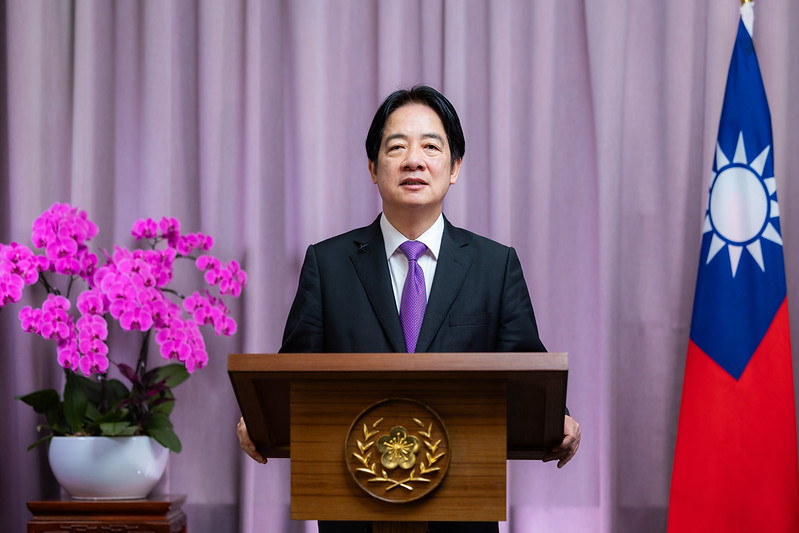News & activities
 News releases
News releases
On the morning of September 25 (afternoon of September 24 EDT), President Lai Ching-te addressed the 2024 Concordia Annual Summit via video at the invitation of the New York-based non-profit organization Concordia, speaking on Taiwan’s key priorities in the current international security environment and vision for the future.
In his remarks, President Lai said that democracy around the world is facing serious threats, citing as examples Russia’s invasion of Ukraine and China’s intensifying military intimidation in the Taiwan Strait and the East and South China Seas. The president indicated that through its use of gray-zone tactics such as economic coercion and cognitive warfare, China poses serious threats to global peace and stability. He said that China often uses lawfare and distorts history to expand its power, an example being its distortion of United Nations General Assembly (UNGA) Resolution 2758. The president thanked the United States and the Inter-Parliamentary Alliance on China (IPAC) for taking concrete actions to oppose China’s misinterpretations.
President Lai reiterated that democratic Taiwan and authoritarian China are not subordinate to each other, and that we will maintain peace and stability in the Taiwan Strait by promoting our Four Pillars of Peace action plan. The president expressed hope that Taiwan and other democratic nations will jointly support the democratic umbrella and counter authoritarian aggression as we navigate a new era in global democratic development. President Lai expressed that a stronger Taiwan is better able to promote democracy, peace, and prosperity around the world, and that we welcome more countries to join in support of democratic Taiwan and a stronger democracy worldwide.
A transcript of President Lai’s speech follows:
I want to begin by thanking Concordia for the opportunity to address the Annual Summit. Since my inauguration in May, I have been sharing Taiwan’s roadmap for development at various international venues. I’m honored to speak on our key priorities in the current international security environment, as well as our vision for the future.
Our goal is to make Taiwan stronger, because a stronger Taiwan is better able to promote democracy, peace, and prosperity around the world.
Our sincere hope is for Taiwan and other democratic nations to jointly support the democratic umbrella and counter authoritarian aggression as we navigate a new era in global democratic development, echoing the theme of this summit.
Democracy around the world is facing serious threats. We have seen the growth of authoritarianism and Russia’s invasion of Ukraine, which has exceeded two years. And we have seen China intensifying its military intimidation in the Taiwan Strait and the East and South China Seas. Through its use of gray-zone tactics such as economic coercion and cognitive warfare, China poses serious threats to global peace and stability.
China often uses lawfare and distorts history to expand its power. I want to emphasize that democratic Taiwan and authoritarian China are not subordinate to each other. This is a fact with a long-established, global consensus. Regardless of that, China has distorted UNGA Resolution 2758 in support of its “one China principle,” falsely claiming that Taiwan is a part of the People’s Republic of China and that we have no right to participate in the UN system and other international fora.
I would like to thank the US and IPAC for taking concrete actions to oppose China’s misinterpretations. We welcome more countries to join in support of democratic Taiwan and a stronger democracy worldwide.
China’s threat to Taiwan is a threat to the entire international community. China doesn’t just want to change the status quo in the Taiwan Strait. It intends to change the rules-based international order and achieve international hegemony.
In this situation, our top priority is to maintain peace and stability in the Taiwan Strait by promoting our Four Pillars of Peace action plan.
First, we will strengthen our national defense. We will strengthen our capabilities and show our resolve for self-defense.
Second, we will build economic security. We will continue to reduce economic dependence on China. We also aim to sign trade agreements with other democratic countries, participate more in the regional economy, and mutually enhance our economic resilience.
Third, we will strengthen our partnerships with democratic countries. Taiwan will continue to cooperate with like-minded partners on “democracy chips.” We will also strengthen cooperation with other countries in national defense so that the democratic community can demonstrate the strength of deterrence and achieve our goal of peace.
The final pillar is stable and principled cross-strait leadership. Taiwan will neither yield nor provoke, and will maintain the status quo in the Taiwan Strait. We will remain committed to safeguarding regional peace and stability.
The road ahead may be difficult, but as long as we follow it together, I am confident that we can further strengthen democracy and sustain peace. Together, let’s forge ahead on the path to greater prosperity. Thank you.
Concordia organizes its annual summit outside the UN headquarters during each year’s General Debate of the UNGA, inviting world leaders and top private sector representatives to seek solutions to global and regional challenges that are highly valued by the UN community. Among those who addressed this year’s summit were President Santiago Peña Palacios of the Republic of Paraguay, President Luis Abinader of the Dominican Republic, Prime Minister Philip Davis of the Commonwealth of The Bahamas, former Prime Minister Theresa May of the United Kingdom, former President Iván Duque of the Republic of Colombia, former President Kolinda Grabar-Kitarović of the Republic of Croatia, US Senators Bill Cassidy and Chris Coons, US House Representative Chrissy Houlahan, UN Deputy High Commissioner for Refugees Kelly Clements, Governor of New York State Kathy Hochul, President of Eurasia Group Ian Bremmer, and President of The Rockefeller Foundation Rajiv J. Shah.



